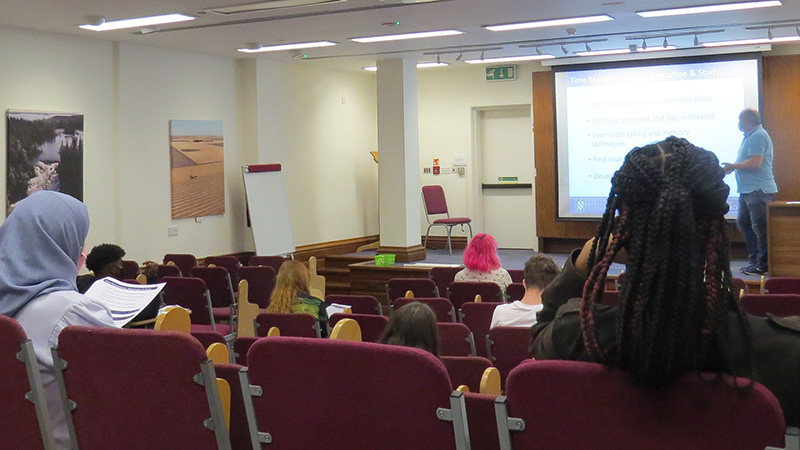Rector Trainor reviews events of the Long Vacation 2020
Long Vacation 2020 at Exeter has been like none of its predecessors – or at least none since the last pandemic a century ago.
Like the rest of central Oxford, Exeter until the last few weeks had been underpopulated for many months. Although a dozen or so (mainly overseas undergraduate) students continued to live at Turl Street, and a few dozen (mainly overseas postgraduate) students stayed in residence at Exeter House on Iffley Road, the summer footfall was much lighter than usual. The University’s venerable External Studies Department summer school at Turl Street was cancelled, as perforce was the Exeter College Summer Programme at Cohen Quad. There were no lunches or dinners, internal or external, in College. Also, there were no graduations and hence no chapel-based presentations of certificates and no marquee-based receptions for new graduates, families and friends. And until the start of this month many College staff were on furlough, while most other staff members, and most Fellows, worked from home. The new College cat, ‘Walter’, matured serenely in a highly tranquil Turl Street environment.
Walter the College cat, whose exploits you can follow on Instagram @walter_the_exeter_cat
Beneath the surface, however, much was happening. A record number of Exeter undergraduates secured Firsts – especially creditable given the highly disrupted last few months of the careers of 2020’s Finalists. A significant minority of College staff, especially from the maintenance department, took advantage of the nearly deserted state of the College to make necessary repairs and improvements. In conjunction with the architects further progress was made on planning the Library renovation/restoration project. Except in August, the College’s COVID-19 action group met weekly, strengthened by the membership of the leaders of the JCR and the MCR. The result was considered reactions to advice from the central University and the Conference of Colleges – and the birth of highly detailed Exeter-specific academic, residential and social plans for the socially distanced return of students from mid-September. Along the way the College has had to adjust to a number of substantial changes (including two in the past 10 days) in Government ‘guidance’.
In mid-August the College dealt with its share of the national crisis concerning A-level results. Using teacher-assessed grades as well as the variety of other information available on individual candidates, and coordinating closely with relevant University departments, Exeter carefully assessed each case where the highly controversial ‘algorithmic’ grades meant that the conditions of Exeter’s offer weren’t met. Without sacrificing academic standards, the College was able to confirm places for all its UK offer holders prior to the Government’s U-turn. The result will be an undergraduate first-year group of about 110, approximately 12 higher than the pre-crisis target. This year’s incoming undergraduates will be Exeter’s most diverse ever in socioeconomic terms (information on ethnicity will not be forthcoming until Hilary Term). Meanwhile, although postgraduate numbers are never certain until ‘0th week’, Exeter – like the rest of the University – looks like having slightly more postgraduates than usual. Similarly, despite difficulties in obtaining visas from UK consulates in the United States, the Williams at Exeter Program at Oxford (WEPO) expects to have 22 students in residence by the time Michaelmas Term begins, and 24 (only two short of the usual number) by January.
Elaborate preparations have been made for this record influx of Exonians. Collaborating with the Domestic Bursar, the Academic Office, and the Catering and Accommodation departments, the leaders of the MCR and JCR have been planning elaborate, largely online Freshers’ Weeks. Under the leadership of Professor Conall Mac Niocaill (Tutor for Undergraduate Admissions) and Steph Hale (Outreach Officer), and assisted by many student volunteers, the College is holding its first fortnight-long ‘bridging’ course during the fortnight preceding Freshers’ Week. This ‘Exeter Plus’ programme is designed to smooth the transition from school to university, which is especially appropriate this year given the severe disruption to the studies of school pupils caused by the pandemic. Seventeen incoming undergraduate freshers are enrolled, and eight others are pursuing an analogous week-long programme organised by the central University.

Tutor for Undergraduate Admissions Conall Mac Niocaill welcomes students to the Exeter Plus programme
Thus September has seen an upsurge in human residents at Turl Street – and a diminution in wildlife, including grass-devouring crows and a fox, who evidently had been attracted by the stillness of the College during the preceding few months. Incoming freshers have been supplemented by students at various stages of their studies who are required to isolate for a fortnight because of international travel. Catering and Hall staff have been returning to work. Virtual activity has increased as well, including the second annual access programme for secondary school students from East Lothian. Continuing the successful precedents set earlier in the pandemic, well-attended alumni webinars were held by two Exeter Fellows: on 27 August by Professor Garret Cotter (Physics) on ‘Breaking the speed limit: exploring the high-energy universe using particles travelling faster than the speed of light’ and on 17 September by Professor Christina de Bellaigue (History) on the British home schooling movement of the 19th and 20th centuries. And College meetings have resumed online, including a very productive meeting of the Black Lives Matter working group, a highly collaborative effort between Fellows and students; the group is developing a programme including a new library collection on racial equality and a seminar and lecture series.

Some of the pupils who took part in the East Lothian access programme
During Michaelmas Term much small group teaching will be in person, provided that both the tutor and the students concerned are comfortable with that format. As concern in the UK mounts about a possible ‘second wave’ of the pandemic, elaborate steps are being taken to ensure that Exeter’s students – and Fellows and staff – stay safe. For example, as I experienced myself yesterday evening, diners in Hall are spread out to a degree that even the scientists who lead briefings at 10 Downing Street would approve. A marquee has been erected in Front Quad to facilitate COVID-security, notably for those queuing for meals in Hall. A systematic testing programme has been made available by the University. And, of course, behind the scenes the Oxford effort to develop a vaccine continues, with a major input from Exeter Senior Research Fellow Professor Cath Green.
Meanwhile, we have mourned the death on 24 July of Emeritus Fellow Professor Ian Michael, who – as King Alfonso XIII Professor of Spanish Studies – played a major part in developing Exeter’s Queen Sofía Fellowship in Spanish. We are also very grateful for the work at Exeter of Professor Dan Snow (Management), who has just left us to take up a senior post at the Marriott Business School at his alma mater Brigham Young University. And an almost-new arrival, Professor Neil Herring (Physiology), is about to begin his first full academic year as an Exeter Tutorial Fellow.
In terms of recent alumni achievements, I note that Exeter alumnae Exeter Betty Makharinsky (2012, Music) and Amelia Anderson (2012, Music) have invented a new open-air classical music festival, the Vache Baroque Festival. During the first week of September the event launched with performances of Henry Purcell’s Dido and Aeneas. This innovative festival was an appropriate finale to an academic year which included the 40th anniversary of women joining Exeter as Rectors, Fellows and Students.
Finally, I would like to point out that Exeter undergraduate Hannah Morris (2019, English) undertook earlier this month a 54-mile riverside walk to raise money to address the persistent, distressing problem of homelessness in Oxford. If you feel inclined to support her efforts, you can do so at www.justgiving.com/fundraising/thamestooxford.
With regard to the imminent new academic year, more than usually we cannot know what it holds for the College. Significant further temporary adjustments in our routines may have to be made. Nonetheless, we have attempted to prepare as carefully as rapidly changing circumstances have allowed. When prudence and Government regulations permit, we’ll resume the in-person alumni activities that usually feature largely at Exeter.
Rick Trainor
Rector

